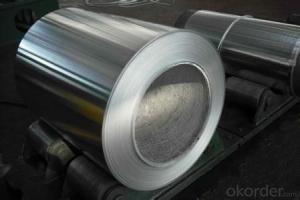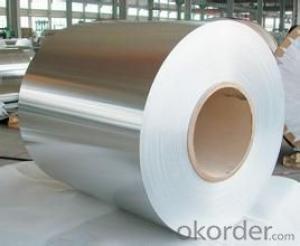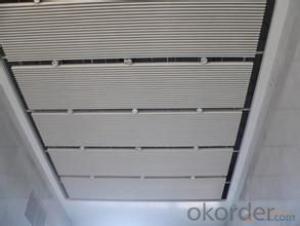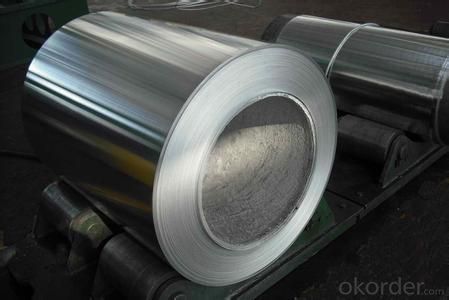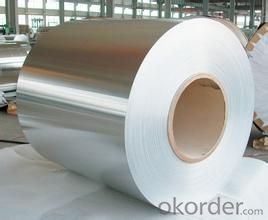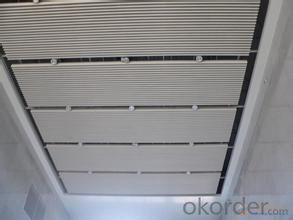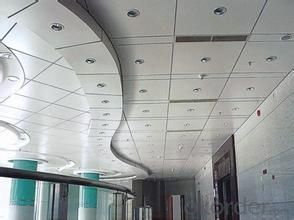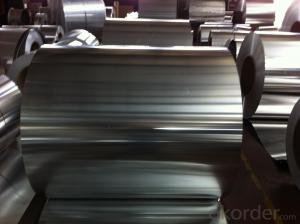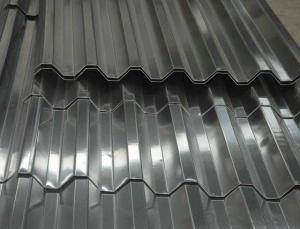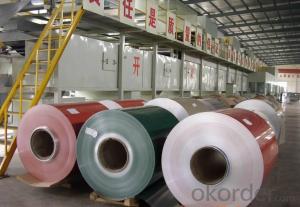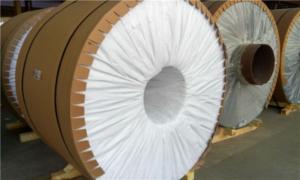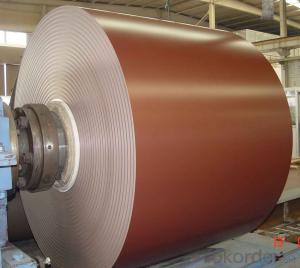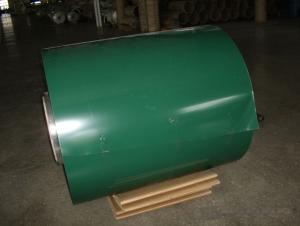1100 Aluminum Coil Alu Roll for Roofing 3003 H18
- Loading Port:
- China Main Port
- Payment Terms:
- TT OR LC
- Min Order Qty:
- -
- Supply Capability:
- -
OKorder Service Pledge
OKorder Financial Service
You Might Also Like
Aluminium is a relatively soft, durable, lightweight, ductileand malleablemetalwith appearance ranging from silvery to dull gray, depending on the surfaceroughness. It is nonmagnetic and does not easily ignite. A fresh film ofaluminium serves as a good reflector (approximately 92%) of visible lightand an excellent reflector (as much as 98%) of medium and far infraredradiation. The yield strength of pure aluminium is 7–11 MPa,while aluminium alloys have yield strengths ranging from200 MPa to 600 MPa. Aluminium has about one-third the densityand stiffness of steel. It is easily machined,cast, drawn and extruded.
Aluminium alloys (or aluminum alloys; see spellingdifferences) are alloysin which aluminium(Al) is the predominant metal. The typical alloying elements are copper, magnesium,manganese,silicon,tin and zinc. There are twoprincipal classifications, namely casting alloys and wrought alloys, both of which are furthersubdivided into the categories heat-treatableand non-heat-treatable. About 85% of aluminium is used for wrought products,for example rolled plate, foils and extrusions.Cast aluminium alloys yield cost-effective products due to the low meltingpoint, although they generally have lower tensile strengthsthan wrought alloys. The most important cast aluminium alloy system is Al–Si,where the high levels of silicon (4.0–13%) contribute to give good castingcharacteristics. Aluminium alloys are widely used in engineering structures andcomponents where light weight or corrosion resistance is required
Specification:
Alloy: AA1050, 1060, 1100,AA3003, 3005, 3015, 5052, 5754, 5083,8011, etc
Temper:H14/16/18/22/24/32, HO etc.
Thickness:0.2mm—100mm
Width: 100mm—2300mm (Can be slitted)
InnerDiameter: 508MM
Coil Weight:500kg-3000kg(Max.)
Application:Foil stock, Circles, Roofing, Can stock, Marine plate,Anti-slipery purpose in vehicles, packing and appliance.
Features:
1. Excellent quality of products
2. Quick delivery
3. Best service to clients
4. BV,SGS avalible
5. No buckle o waveness
6. Tension leveling
7. Certificate of Origin
8. Form A,E
Packaging Detail:
Carton ,Woodenpallet with plastic protection packing ,standard seaworthy packing or as yourrequest.
ProductionCapacity:
AnnualProduction capacity of 600,000 tons.
Products areexported to United States, Canada, U.A.E, Brazil, Mexico,Thailand, Vietnam,Nigeria etc, over 100 countries andregions all over the world.
Production Line:
CNBM aluminumproduction base is comprised of 18 aluminumannealers, 10 coil and foilmills, 4 continuous production lines, 2hot rolling production line and 3prepainted lines.
FAQ:
1. What is the form of payment?
Normally 30% TT, L/C
2. Type of quotation?
FOB, CFR, CIF
3. Port of loading?
Shanghai port
4. Delivery time?
30 day after client’s deposit
- Q: Can aluminum coils be used in the production of kitchen utensils?
- Kitchen utensils can indeed incorporate aluminum coils in their production. Aluminum is a favored material for kitchen utensils owing to its lightweight nature, durability, and ability to conduct heat. Aluminum coils are effortlessly malleable, allowing them to take on various forms and designs for utensils like pots, pans, baking trays, and even cutlery. Moreover, aluminum possesses resistance against corrosion, making it a suitable choice for contact with food and liquids. Nevertheless, it is essential to keep in mind that aluminum utensils may require a non-stick coating or a protective layer to prevent any adverse reactions with acidic or alkaline foods. Ultimately, owing to their adaptability and practicality, aluminum coils are extensively employed in the production of kitchen utensils.
- Q: What are the different grades of aluminum used in coils?
- Coils utilize various grades of aluminum, each boasting unique properties and applications. Notable grades encompass: 1. The 1000 series, a commercially pure aluminum, excels in fighting corrosion. It finds its niche in chemical processing devices and marine components, where corrosion resistance reigns supreme. 2. The 3000 series alloys shine with moderate strength and impressive formability. Their versatility sees them employed in cooking utensils, heat exchangers, and general sheet metal fabrication. 3. The 5000 series grade impresses with its weldability and corrosion resistance. Marine settings, transportation, and structural components all benefit from its presence. 4. The 6000 series alloys blend strength, formability, and corrosion resistance. As a result, they abound in architectural applications - window frames, doors, and curtain walls. 5. The 7000 series grade touts high strength and toughness. It's a favorite contender within aerospace, sporting goods, and automotive realms, where robustness is paramount. These examples merely scratch the surface of the aluminum grades employed in coils. Selecting the appropriate grade hinges on application-specific criteria like strength, corrosion resistance, formability, and weldability.
- Q: Can aluminum coils be used in heat sinks?
- Indeed, heat sinks can employ aluminum coils. Aluminum, renowned for its remarkable thermal conductivity, stands as a favored option for heat sinks. The prime purpose of these sinks is to avert overheating by expelling heat from electronic components and other devices. By incorporating aluminum coils into heat sinks, one can augment the surface area, thereby intensifying heat dissipation. The coils can assume diverse shapes and be arranged in different configurations to optimize cooling efficiency. Moreover, aluminum boasts not only being lightweight but also resistant to corrosion, rendering it a sensible and economical selection for heat sink applications.
- Q: I'm 14 an was told that aluminum free deodorant would stop yellow stains on my white shirts, so which female deodorant would help stop yellow stains
- Deodorant with aluminum also causes breast cancer. I use Toms of Maine deodorant, which is aluminum-free.
- Q: This question asks for a comparison of the benefits and drawbacks of utilizing aluminum coil in insulation applications.
- <p>Aluminum coil has several advantages for insulation, including its high thermal conductivity, which allows for efficient heat transfer, and its lightweight nature, making it easy to handle and install. It also offers good resistance to corrosion and is cost-effective compared to other materials. However, it has some disadvantages such as low strength, which may require additional support structures, and it can be prone to denting or damage if not handled carefully. Additionally, aluminum's high conductivity can lead to increased heat loss if not properly insulated, and it may require more frequent maintenance due to its susceptibility to environmental factors.</p>
- Q: Are aluminum coils suitable for marine applications?
- Yes, aluminum coils are suitable for marine applications due to their excellent corrosion resistance properties in saltwater environments.
- Q: Why does fillet appear when rolling aluminum coil?
- How thick and wide is it when there is such problem? Which is the rolling pass? And what is the type of the rolling mill? The simple 4 rollers or CVC and HC rolling mill with roller control. Does the filler appear in rolling or out of roller? Different thickness will lead to different analysis.
- Q: Can aluminum coils be used in automotive heat shields?
- Yes, aluminum coils can be used in automotive heat shields. Aluminum is a commonly used material in the manufacturing of heat shields due to its excellent heat resistance and lightweight properties. Aluminum coils can be formed and shaped into the desired design, allowing for easy installation and customization in automotive applications. Additionally, aluminum has high thermal conductivity, which helps to dissipate heat effectively, making it an ideal choice for heat shields in vehicles.
- Q: How do aluminum coils contribute to energy efficiency in buildings?
- The use of aluminum coils is crucial for improving energy efficiency in buildings. To begin with, aluminum is an extremely conductive material, allowing for efficient heat transfer. This characteristic is particularly important in HVAC systems, where aluminum coils are commonly employed. These coils aid in the transfer of heat between the indoor and outdoor units, enabling effective temperature regulation and decreasing energy usage. Furthermore, aluminum coils are lightweight, making them easier to handle and install. This not only saves time and labor costs but also reduces the overall weight of the HVAC system, resulting in lower energy requirements for operation. Additionally, the lightweight nature of aluminum coils allows for the creation of compact systems, conserving valuable space in buildings. Additionally, aluminum is highly resistant to corrosion, ensuring the long-lasting and durable nature of the coils. This resistance to corrosion is especially vital in areas with high humidity or exposure to harsh weather conditions. By maintaining their effectiveness over time, aluminum coils minimize the need for frequent replacements, thereby reducing energy consumption associated with the manufacturing and installation processes. Another significant advantage of aluminum coils is their recyclability. Aluminum is one of the most widely recycled materials globally, with a high recycling rate and minimal loss of quality during the process. By utilizing aluminum coils, buildings contribute to a more sustainable and environmentally-friendly approach, as the material can be recycled repeatedly without compromising its performance. Moreover, the recycling process requires significantly less energy compared to primary aluminum production, resulting in reduced greenhouse gas emissions. In conclusion, aluminum coils play a crucial role in enhancing the energy efficiency of buildings through their high conductivity, lightweight nature, corrosion resistance, and recyclability. By facilitating efficient heat transfer, reducing energy consumption, and promoting sustainability, aluminum coils play a vital role in improving the energy efficiency of HVAC systems and overall building performance.
- Q: How do aluminum coils contribute to energy-efficient lighting systems?
- Aluminum coils are essential components in energy-efficient lighting systems due to their unique properties and functionalities. Firstly, aluminum is an excellent conductor of electricity, allowing for efficient energy flow within the lighting system. This property ensures that minimal energy is lost during transmission, maximizing the overall energy efficiency of the system. Moreover, aluminum coils are lightweight and durable, making them ideal for use in lighting systems. The lightweight nature of aluminum allows for easier installation and handling, reducing the overall energy required during the manufacturing and installation processes. Additionally, aluminum's durability ensures that the coils can withstand the rigors of daily use without compromising performance, further contributing to the longevity and efficiency of the lighting system. Furthermore, aluminum has excellent thermal conductivity, allowing for efficient heat dissipation. Heat management is crucial in lighting systems as excessive heat can reduce the lifespan and efficiency of the bulbs. By using aluminum coils, the heat generated by the lighting system can be effectively dispersed, minimizing the risk of overheating and ensuring optimal performance. In summary, aluminum coils contribute to energy-efficient lighting systems by providing efficient electrical conductivity, lightweight and durable construction, and effective heat dissipation. These properties help to minimize energy loss, reduce manufacturing and installation energy requirements, and enhance the overall efficiency and longevity of the lighting system.
Send your message to us
1100 Aluminum Coil Alu Roll for Roofing 3003 H18
- Loading Port:
- China Main Port
- Payment Terms:
- TT OR LC
- Min Order Qty:
- -
- Supply Capability:
- -
OKorder Service Pledge
OKorder Financial Service
Similar products
Hot products
Hot Searches
Related keywords
